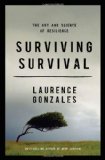The Art and Science of Resilience
by Laurence Gonzales
W. W. Norton & Company, New York, 2012. 257 pages.
Surviving Survival looks at people who have survived traumatic experiences — and looks at how they live the rest of their lives afterward.
Your experience of life in the aftermath may be even more dramatic, sometimes more painful, than the experience of survival itself. But it can be beautiful and fulfilling, too, and a more lasting achievement than the survival that began it all. What comes after survival is, after all, the rest of your life.
Many of the people whose stories he tells survived horrific experiences. They range from shark attacks and bear attacks to loss of a child or maiming in war. He tells many, many stories, and they don’t all end happily. I found myself getting depressed when he said he needed to balance it out by showing people who did not overcome!
The author doesn’t sugarcoat what these people lived through and now face every day. He explains why the aftermath is so difficult, and looks at many different strategies that work for these people as they live out the rest of their lives.
This book is mostly fascinating. And though I sincerely hope I will never face trauma at the level of the author’s examples, everybody faces smaller traumas throughout their lives. And the author shows techniques that can help you recover from those traumas and live a fruitful life.
One insight that struck me early on involved my vestibular migraines. I had a stroke a year and a half ago. It was in my cerebellum, the center of balance, and was manifested by the room suddenly spinning. After the stroke, I started getting, for the first time in my life, vestibular migraines. They aren’t headaches, but the mechanism is similar to migraine headaches. But instead of head pain, I get a vague dizziness. And it reminds me of nothing so much as my stroke. And that scares me.
This book explained to me why that’s so, why it’s going to take a long time before that’s not a perfectly normal reaction. Here he’s talking about someone who was shipwrecked and witnessed the deaths of her friends.
Much of what the brain does is unconscious. It works behind the scenes to forge memories of what is dangerous and what is beneficial so that in the future we can respond correctly and automatically. During her crisis, Debbie’s brain was working overtime to map out those memories in preparation for the next assault. In the brain, the cardinal rule is: future equals past; what has happened before will happen again. In response to trauma, the brain encodes protective memories that force you to behave in the future the way you behaved in the past. Any sight, sound, or smell, any fragment of the scene in which you were threatened, can set off that automatic behavior. The trouble was that in all likelihood, Debbie would never again face a similar hazard. It is rare to be shipwrecked…. In other words, Debbie’s natural and normally useful systems for forming important memories were working on a job that had no practical value. Indeed, those systems were working to make her miserable.
And that’s not the only effect of trauma. Laurence Gonzales examines many, many cases, and looks at people with varying degrees of coping. At the end of the book, he summarizes what he’s learned about rising above survival and living well after trauma.
This book is fascinating like a train wreck, but it throws in good insights for living along the way.
Find this review on Sonderbooks at: www.sonderbooks.com/Nonfiction/surviving_survival.html
Disclosure: I am an Amazon Affiliate, and will earn a small percentage if you order a book on Amazon after clicking through from my site.
Source: This review is based on a library book from Fairfax County Public Library.
Disclaimer: I am a professional librarian, but I maintain my website and blogs on my own time. The views expressed are solely my own, and in no way represent the official views of my employer or of any committee or group of which I am part.
